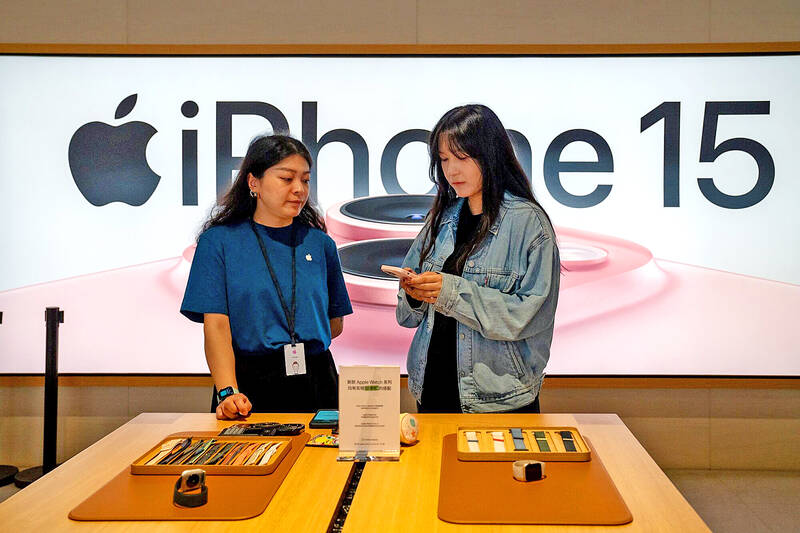Apple Inc’s iPhone sales slump in China is deepening and the company is likely to see volumes decline further this year, Jefferies analysts led by Edison Lee (李裕生) said.
The iPhone maker’s latest generation got off to an atypically sluggish start in China last year, which most recently expanded to a 30 percent year-on-year decline, Lee and colleagues said in a note on Sunday, citing industry checks.
The rest of the country’s mobile market grew last month, with Huawei Technologies Co (華為) growing the fastest on the back of its new Mate 60 device lineup.

Photo: Bloomberg
Weeks before the iPhone 15 went on sale in September last year, Huawei’s debut of the Mate 60 Pro — which runs on a new made-in-China system processor — spurred a patriotic fervor that reclaimed some of the customers it previously lost to Apple.
Jefferies estimates that Huawei shipped 35 million smartphones last year, with some supply constraints preventing that number from being larger.
Apple saw a double-digit percentage fall in volume last month and Jefferies forecasts a similar decline for this year.
Discounts on Apple’s smartphone range increased last week across various online shopping portals, cutting into the average selling price without stimulating growth in volume.
Apple gained share in China after US sanctions cut Huawei off from the world’s leading chipmakers, such as Taiwan Semiconductor Manufacturing Co (台積電), in 2020.
The Shenzhen-based electronics firm’s return to competitiveness in the mobile market has seen it claw back market share, and it is now developing its own software ecosystem to compete with Apple’s iOS and Alphabet Inc’s Android.
Separately, Hon Hai Precision Industry Co (鴻海精密), the world’s largest assembler of iPhones which is known internationally as Foxconn Technology Group (富士康科技集團), is losing a long-time executive in India, just as the manufacturer is pushing to expand in the South Asian country.
Josh Foulger, the country head of Foxconn’s Bharat FIH arm, is leaving the company after nine years, people familiar with the matter said.
Foulger, a three-decade veteran in the electronics industry, has helped the Taiwanese contract manufacturer and its customers including Xiaomi Corp (小米) expand in India.
Over time though, Bharat FIH began losing share of the Xiaomi business as the Chinese brand sought more local partners in India after the country’s government encouraged manufacturers to work more closely with Indian suppliers.

Intel Corp chief executive officer Lip-Bu Tan (陳立武) is expected to meet with Taiwanese suppliers next month in conjunction with the opening of the Computex Taipei trade show, supply chain sources said on Monday. The visit, the first for Tan to Taiwan since assuming his new post last month, would be aimed at enhancing Intel’s ties with suppliers in Taiwan as he attempts to help turn around the struggling US chipmaker, the sources said. Tan is to hold a banquet to celebrate Intel’s 40-year presence in Taiwan before Computex opens on May 20 and invite dozens of Taiwanese suppliers to exchange views

Application-specific integrated circuit designer Faraday Technology Corp (智原) yesterday said that although revenue this quarter would decline 30 percent from last quarter, it retained its full-year forecast of revenue growth of 100 percent. The company attributed the quarterly drop to a slowdown in customers’ production of chips using Faraday’s advanced packaging technology. The company is still confident about its revenue growth this year, given its strong “design-win” — or the projects it won to help customers design their chips, Faraday president Steve Wang (王國雍) told an online earnings conference. “The design-win this year is better than we expected. We believe we will win

Chizuko Kimura has become the first female sushi chef in the world to win a Michelin star, fulfilling a promise she made to her dying husband to continue his legacy. The 54-year-old Japanese chef regained the Michelin star her late husband, Shunei Kimura, won three years ago for their Sushi Shunei restaurant in Paris. For Shunei Kimura, the star was a dream come true. However, the joy was short-lived. He died from cancer just three months later in June 2022. He was 65. The following year, the restaurant in the heart of Montmartre lost its star rating. Chizuko Kimura insisted that the new star is still down

While China’s leaders use their economic and political might to fight US President Donald Trump’s trade war “to the end,” its army of social media soldiers are embarking on a more humorous campaign online. Trump’s tariff blitz has seen Washington and Beijing impose eye-watering duties on imports from the other, fanning a standoff between the economic superpowers that has sparked global recession fears and sent markets into a tailspin. Trump says his policy is a response to years of being “ripped off” by other countries and aims to bring manufacturing to the US, forcing companies to employ US workers. However, China’s online warriors